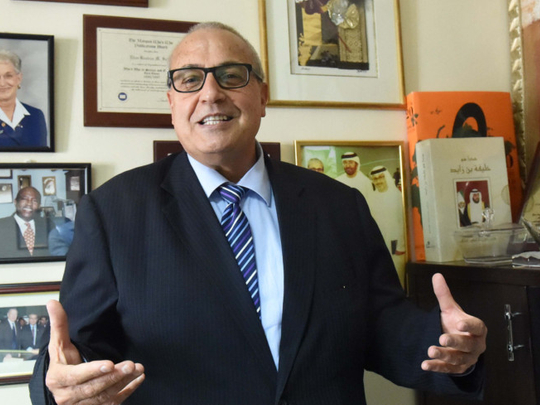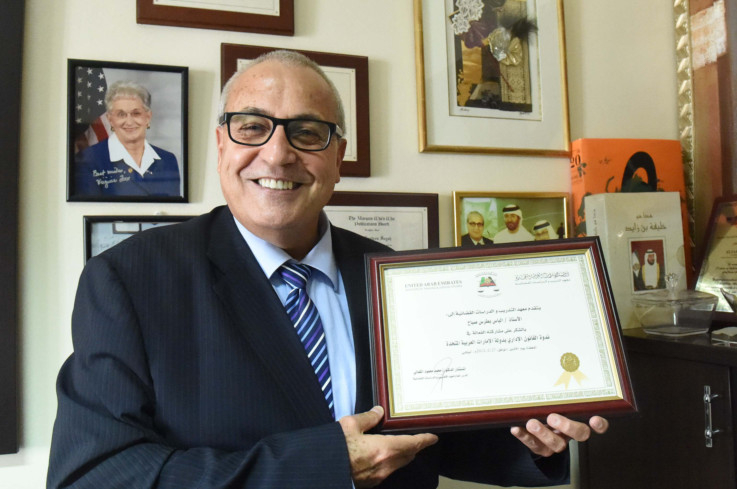
Abu Dhabi: He was waiting for a car but a bicycle arrived in front of his villa and the “driver” asked him to sit in the rear seat.
“That was the daily transportation arranged by the bank in Abu Dhabi for my internship with them during the summer vacation in 1973 [after completing grade 10],” Dr Elias Sayah, 62, recalled about his initial years in the 48 years of his life in Abu Dhabi in an interview with Gulf News.
It was too hot and the next day onwards, he would hold an umbrella that would cover him and his “driver”, Mukhtar, the Indian office assistant at the branch of the international bank.
“I enjoyed that ride from my home on Hamdan Street to the office [on the other end of the same street] as Mukhtar was a nice man who took care of me very well.” Sayah, a Lebanese American, reached Abu Dhabi on February 22, 1970 with his mother and four siblings to join his father who was working at a desalination plant at Al Mina.
“As life was simple, my father’s monthly salary of 130 Bahraini dinars [almost equal to Dh1,300 then] offered a pleasant and satisfying life to the seven-member family!” (Abu Dhabi had used Bahraini dinar as currency between 1966 and 1973.)
A Thursday flight used to bring fresh fruits and vegetables from Lebanon, which would immediately fill the shelves of a shop in his neighbourhood. “Then I never imagined that fresh organic vegetables and fruits grown in greenhouses in Abu Dhabi would be available in the market throughout the year in future.”
Most of the people used to walk around and cycle across the city as private cars and public transport were not popular those days, he said.
“You would see people enjoying tea and coffee made on charcoal and dates at coffee shops in a relaxed environment. As life was not so busy, everyone had enough time to talk and interact with each other.”
His family members and friends used to go to Al Maqta beach [where the Maqta Bridge is situated now] for fishing in the evenings.
Emiratis, Arabs, Indians, Pakistanis and Bangladeshis, all were friends and watched Hollywood, Bollywood and Arab films together at open cinemas at Al Maria on Hamdan Street and Eldorado on Electra Street, he said.
People were not so rich then and life did not have many luxuries. “But there was a human touch in everything.”
He said in a lighter vein that now people sit together and text to each other, without bothering to strike up a conversation.
He said that the human touch taught him many things in life.
Apart from his boss, Mukhtar [the driver], who was very popular at the office with his pleasing personality, taught him many things.
- Dr Elias Sayah | Abu Dhabi resident for 48 years
Many years later, when he attended a job interview at the same bank in the United States, after completing his studies there, the former boss was on the interview board. “He had worked his way up to a top position. Although I did not accept that job offer, I was delighted to see my former boss in a coveted position.”
It was inspiring to see that a professional worked in a small city like Abu Dhabi in 1970s had enough exposure to reach that position. “Perhaps the human touch in life must have also played a role.” Sayah said.
It was just a beginning. He saw many such people who worked in the UAE in the US and elsewhere in the world.
He was fortunate to get a scholarship from Abu Dhabi Government to study his BS in Engineering [and later MS also] at San Diego State University in the US just after completing his Grade 12 in 1976. “As I had scored high marks, my father wrote a letter to Shaikh Zayed (Bin Sultan Al Nahyan] seeking his assistance for higher studies. Shaikh Zayed immediately granted the scholarship,” Sayah said.
After working with a US firm as an engineer, he started his own engineering consultancy business in Abu Dhabi in 1990. “Now two of my children are studying at top universities in the US and the UK. Life treated me well here. That’s why I would like to say that I am a Lebanese by birth, American by passport and a UAE citizen at heart.” Sayah said.









